For over 24 years, Umphrey’s McGee have pushed the limits onstage — playing an improvisational progressive rock style that effortlessly merges genres, moods, meters, and tempos. They’re veterans now, but back in September 2001, they’d just graduated from the University of Notre Dame and everything was still fresh.
Umphrey’s had built a strong following outside of their midwest base and, independently, expanded their reach with a unique live approach. In fall 2001, having made major headway on the touring circuit, they set out on their second big East coast tour of that year. It was a pivotal month for the band — during a time of national tragedy, they staged what could be their most meaningful show.
Before heading out on the road, Umphrey’s McGee had built the trek around a September 10th gig at New York City’s jam band haven Wetlands Preserve, a venue they’d played several times before. Owned by promoter Peter Shapiro — the current owner of the Capitol Theater outside of the city and Brooklyn Bowl — the Wetlands was a TriBeCa venue that booked both established and rising artists in that scene.
Just after their fall tour was booked, the Wetlands lost its lease and the Umphrey’s show was canceled. Shapiro, wanting the venue’s final shows to honor the legacy of the club, brought back its decorated alumni to close in style. Had the show not been canceled, the band would have found themselves in New York City on the morning of 9/11.
What follows is the story of that time, told directly by the band members and their associates.
Peter Shapiro, former Wetlands owner: On the night of Sept. 10, Warren Haynes, Mike Gordon, Stanley Jordan, and DJ Logic played the show instead of Umphrey’s. We had to cancel their show. It was the end of the venue, and we had to go out strong! We had some huge acts. Lots of people were at that show; it went ‘til almost 6 am. My friend, live music fan, and photographer, Greg Aiello, had a pretty amazing story because of that show. He was going to miss it but then heard that Mike Gordon from Phish and Warren Haynes were going to show up at the Wetlands. He worked at Oppenheimer Funds on the 32nd floor of Tower 2. He walked out of The Wetlands as the sun was coming up and headed over to crash at a friend’s apartment. He was awakened to his phone buzzing constantly; his family couldn’t reach him and thought he was at work. Greg says that, for so many reasons, music literally saved his life!
Joel Cummins, keyboards: There’s no shame in being bumped because Bob Weir needed your slot. That said, playing the Wetlands was a huge badge of honor, and it had somewhat of a built-in audience that launched the careers of many young bands on the scene. So losing an important gig like that really felt like it could hurt our momentum in New York City. We’ve played the Wetlands maybe two or three times before then. And it was like, you know, Jam Band Mecca of New York City. If you wanted to play the place that mattered, that was where you played. So getting canceled was kind of a bummer. But then when we found out we got the Lion’s Den gig with Addison Groove Project. We were like, OK, cool. This will at least be something that’s salvaging the tour. We’re getting to play in New York City.
Sept. 8, 2001
Before they headed to New York, Umphrey’s was in Pittsburgh for their friends’ wedding, where — after commandeering the event space after hours — the first-ever “Jimmy Stewart” sessions took place at the Jimmy Stewart Ballroom at the Renaissance Pittsburgh Hotel. The staff let the band play uninterrupted late into the night as they explored the musical language of improvisation. The essence of the “Jimmy Stewart” concept was to improvise in a way that sounded planned and scripted. Umphrey’s attempt to perform new music in real-time in front of an audience.
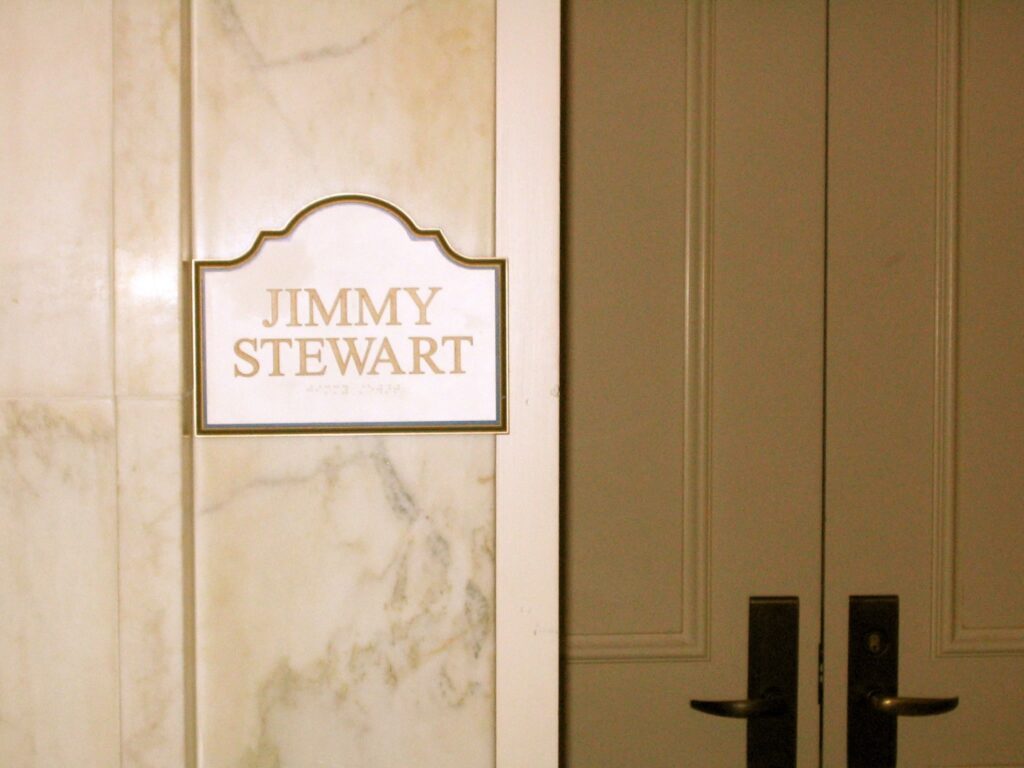
Vince Iwinski, manager: While we’re in Pittsburgh, we have to restructure the tour. We ended up, I think, in Pittsburgh an extra night. I believe Jeremy (the groom) put us up somewhere, and then we made our way to Ithaca, New York.
Cummins: Thinking we’d disguise ourselves, we turned out the lights in the room and just tried to play. Turned out, it made us listen to each other. But the front desk one floor below us also knew exactly what we were up to. Turns out, they didn’t care as long as no one complained.
Kevin Browning, manager: Playing that night in Pittsburgh was a penultimate moment we didn’t yet understand. Celebrating the nuptials of great friends was joyous enough in its own right, crystallizing the essence of what would prove to be the UM trademark was beyond expectations.
Sept. 10, 2001
After Pittsburgh, the band headed to Ithaca, where they were now scheduled to play the Haunt on 9/11. They found a band and breakfast, a retreat for bands on the road, run by a guy named Way who advertised in Relix. Deep in the woods with no TV or internet, the house had an analog vibe.
Cummins: The place was not what we expected it to be. Unfortunately the “Band and Breakfast” did not underpromise and overdeliver. Upon our arrival, we discovered the advertised hot tub needed to be filled by warming cauldrons of water on the stovetop. The owners then asked us to turn down the electric instruments at something like 9:30 p.m. that night because he was going to sleep with his girlfriend in a room next door. We were promised all-night jams! So we had to just get drunk and play acoustics and singalongs on the porch that night.
Browning: We did everything you would expect a young band on the road to do at a retreat like this — we drank, played guitar, wrote music, and partied all night. We stayed up way too late at Way’s place after the show. It was sitting on the porch playing acoustic guitars in a cabin in the woods. They started messing around with this improvisational stuff that they had just done a few days prior with no idea the next morning would bring us something none of us would ever forget.
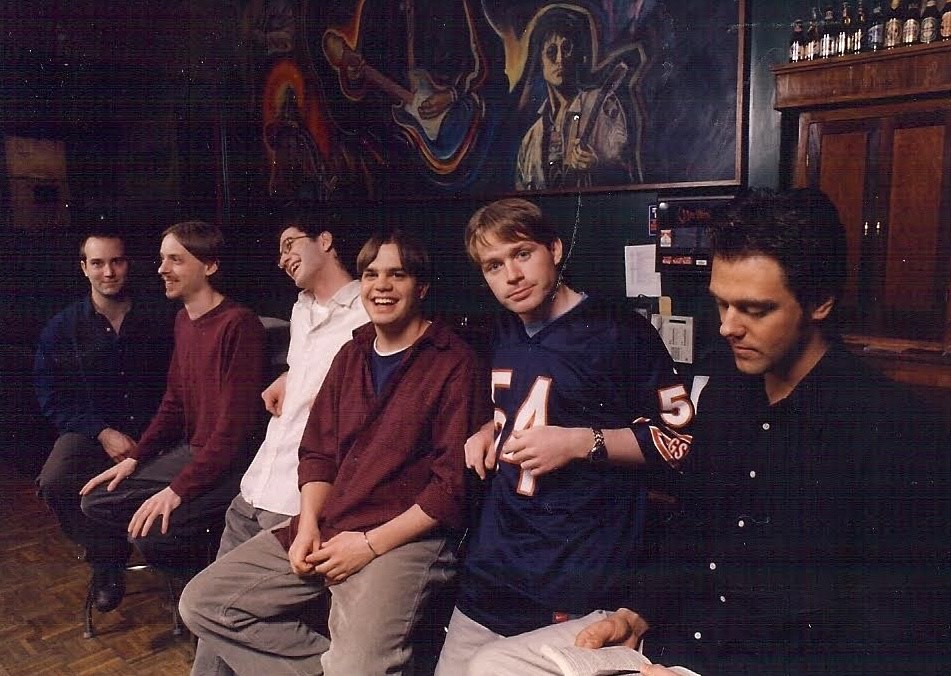
Sept. 11, 2001
On the morning of Sept. 11, Iwinski woke up late to a number of missed calls from his sister on his cell phone. (Remember, this was 2001 — he was the only one with a cell phone.) When she finally got ahold of him, she told him to wake everyone up and to turn on the news immediately. The country was under attack.
Iwinski: Sept. 14 was the rescheduled New York date. We were bummed we couldn’t play the Wetlands anymore, so we booked the Lion’s Den in New York. The Lion’s Den was owned by New York firemen. I’ll get to that part of the story later. The night before, we probably overindulged. I was the only person with a cell phone at the time. I’ll never forget my little orange Nokia phone with its annoying ring. My phone kept ringing and ringing on the morning of Sept. 11. Everybody was asleep. Bayliss woke me up because it was ringing non-stop. I’m kind of groggy but fully woke up when I saw all the missed calls from my sister.
My sister, who’s eleven years older than me, says, “Where are you?” And I was like, “I’m in upstate New York. What’s the problem?” She’s like, “Do you not know what’s going on right now?” “I don’t know; I’ve got a headache. I know THAT’s for sure!” And she said, “Turn on the TV now.” I said, “OK, but there’s no TV here. And she said, “The World Trade Center has been attacked. Are you in New York?” I’m like, “I’m in upstate New York.” And she’s like, “Go find a TV and get somewhere safe.” She’s getting crazy. And so I wake everybody up. I said that my sister just called me and something was going on. And so we kind of throw ourselves together and jump into Kevin’s Suburban and drive into town. There was a TV store, or some sort of electronics store with TVs on, and people are standing outside watching the footage of what’s going on. And we’re like, holy shit. We didn’t know what to do. Remember that movie Red Dawn? It kind of started to feel a little like that. What should we do? We ended up going for a hike in the woods, to a waterfall in Ithaca. We wanted to talk and hike and assess and try to wrap our heads around what the hell is going on. And we’re supposed to go to New York later that week.
Cummins: Like everyone else in the country at that moment, on that day, we needed to try to make sense of it all. We were in our mid-20s; we had no idea what to do. The guys decided to take a hike up to some of the waterfalls in Ithaca to figure out what they were going to do about their show that night and process the unthinkable tragedies of the day. After our hike we went to the venue, the Haunt, to see if the show would still be on, and it was. The venue had its TVs on, which made it hard for anyone to focus on anything other than the country being under attack. We were glued to the TV even when we were supposed to be focusing on soundcheck.
Throughout the years, any time a well-known musician died or the country experienced a notable event, the band often paid homage to it through their shows. That night, they played Jaco Pastorius’ version of “America the Beautiful” led by bassist Ryan Stasik, and the room went silent.
Ryan Stasik, bass: You could hear a pin drop. I was in shock, along with the rest of the world. The venue was replaying the planes hitting the towers ad nauseam on the televisions. Performing Jaco Pastorius’ version of “America the Beautiful” was a healing moment in a time of tragedy. Luckily music was still there to help out, even for just a moment.
Andy Farag, percussion: We didn’t think we would even be playing, I mean, the mood was definitely somber. But we also felt like it was the right thing to do to still play a show. The turnout wasn’t great, so, yeah, it was a little strange. But we all still thought it was the right thing to do.
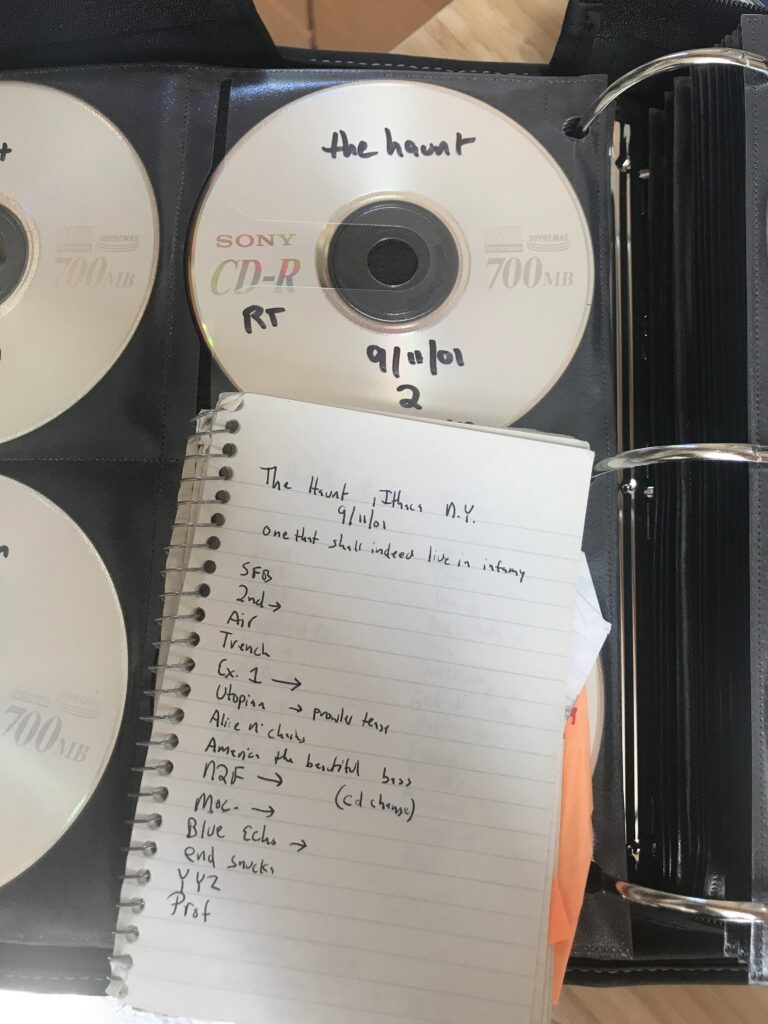
Sept. 12, 2001
Howie Schnee, a concert promoter in New York City, had shows booked all over the city the week of 9/11. With the nation under attack and the city shut down, Schnee had a lot of rescheduling to figure out and not much time to do it. He called Iwinski to see if Umphrey’s was still interested in playing in the city on Sept. 14. After the Wetlands cancellation, it was a show they booked to replace it. The band wasn’t sure if the show would be canceled.
A Boston show at House of Blues on Sept. 13 was still scheduled, and the band headed there from Ithaca. Upon arrival, the city was eerily quiet. There were no planes overhead, little traffic, and people were still on edge. “It was so strange looking up in the sky and see no planes,” says singer-guitarist Brendan Bayliss.
Browning: The scope of the tragedy took days to sink in. The reality that most of those lost wouldn’t be found became clearer. We didn’t know exactly how the world would change, but we knew it would all be different from then on. Waiting for an imminent war is sobering.
Cummins: The NYC Lion’s Den gig had been booked some time in early August. After we heard of The Wetlands fiasco that canceled our Sept. 10 show, there we were offered a co-bill with our friends Addison Groove Project. On Sept. 12 or Sept. 13, promoter Howie Schnee called and told us Addison Groove Project didn’t feel right playing the show and that they were going to back out. Howie told us he would still love to have us and that we could now play two sets if we wanted. We asked what he thought, and he said, “I think people will really need live music by Thursday night. All we’ve done is stare at the TV in disbelief for the past two days.” So we made the decision to play the gig, against some of our families’ wishes, who were naturally still concerned for our safety out on the road. We knew we needed to do the show, and we wanted to do it. It was such a weird time. We just wanted to take people’s minds off of it.
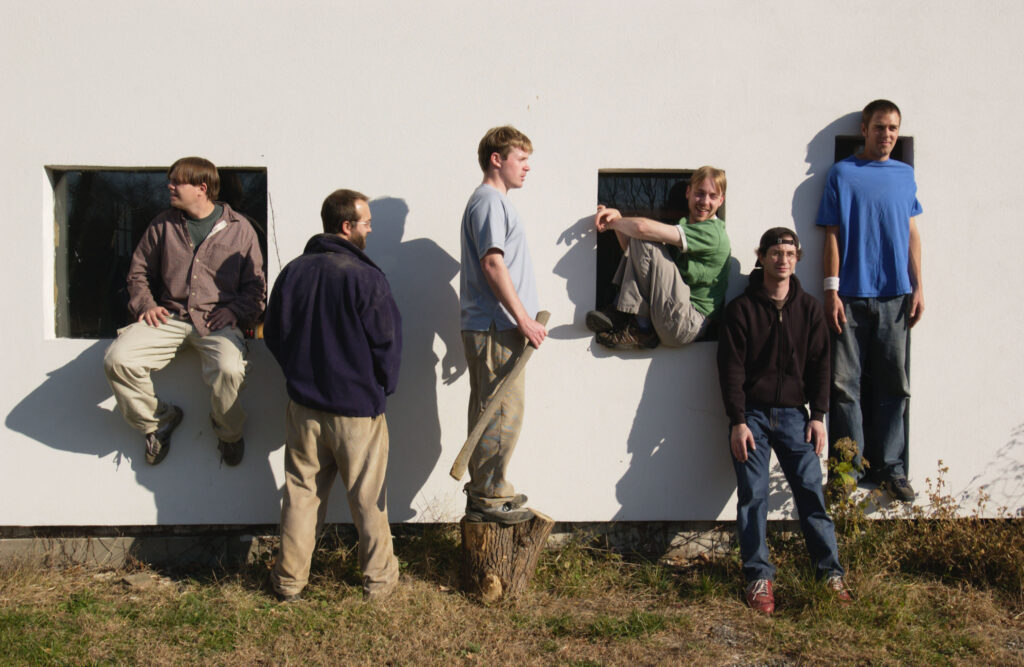
Sept. 13, 2001
The Boston show at House of Blues was sold-out. That night, the city was on edge. Bayliss remembers that one of the terrorists’ vans was found across the street from the hotel where they were staying. American Airlines Flight 11 took off from Logan Airport with five terrorists aboard.
Everyone was so on edge that the venue had to be cleared out during the set break show since the fire alarm went off. The fire department cleared the venue, but the alarm went off not because of a fire: instead, the band set it off by smoking weed.
Cummins: Yeah, we were smoking weed in the green room. We have a bad history in Boston of getting in trouble with security. But that’s another story. We set off the fire alarm, and it totally freaked everyone out because it was, you know, right after 9/11. We had to say we were stoners and we’re really sorry. And they had a serious restaurant at that point. It was full of people dining, and they had to clear every closet in the entire building. Jesus. But yeah, it definitely was one of those times when everybody was still on edge. Only when it was at the end of the night, and the venue was closed, could we actually laugh about it.
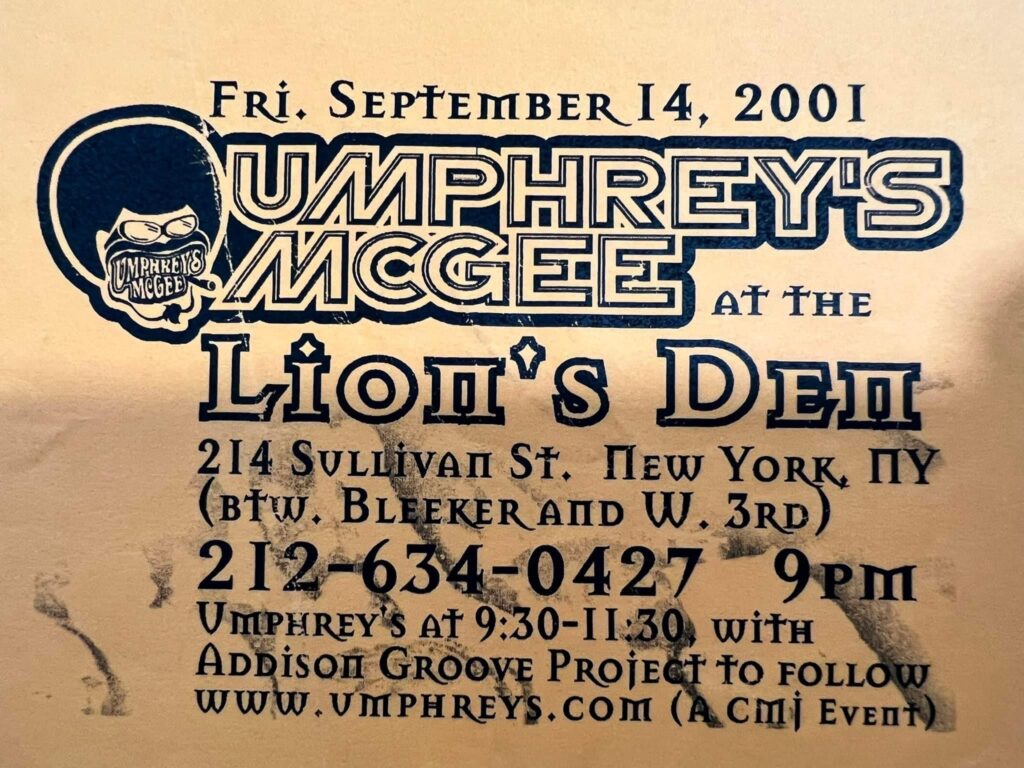
Sept. 14, 2001
The Lion’s Den wasn’t only a well-known club in Manhattan, but it was also owned by some special people. Umphrey’s McGee weren’t aware of this until they arrived at the Greenwich Village venue.
Iwinski: We immediately realized that not only would we do the show, but we also wanted to do it for the firemen and the people of New York City. We all knew we had to be there and play a great show that night.
Cummins: Andy Farag, our half-Egyptian percussionist and best driver in the band, was driving when we arrived in NYC. We somehow came through the wrong lane of the Lincoln Tunnel and ended up in a “city bus only” lot. Security immediately surrounded us for questioning and we explained who we were and what we were doing. President George W. Bush was at the World Trade Center that day accessing the damage and to give a speech. After a quick look into the trailer, they bought our story and sent us back out the correct way to get to the venue. There was an eerie calm once we rolled up to the venue, with the wreckage of the Twin Towers in plain sight just a few blocks down the street. I couldn’t bring myself to walk down there — it was just too fresh. The smell reeked of burning plastic, metal, fuel, and humanity. It was painful even at that distance. The smell will always be with me.
Brendan Bayliss, lead vocals and guitar: Driving into New York, I remember everybody was just quiet. We weren’t really listening to music, and you could see the smoke from like an hour away. It was almost like we were driving into a war zone. That kind of felt dangerous. And should we be doing this? The Lion’s Den, where the gig was, was close to Ground Zero. I remember at one point we had a little bit of time, and a few of us walked and got as close as we could. It was all barricaded off, but you could smell burning. And it was like we were literally in a war zone. There were cops running red lights left and right. It smelled like poison, like something I shouldn’t be breathing in.
Jake Cinninger, vocals and lead guitar: When we finally did get the Lion’s Den show, we pulled up to the venue. And I believe the Lion’s Den was owned by a lot of firefighters. It was kind of like their local bar hangout. So when we pulled up and loaded in equipment, there were soot-covered firemen at the bar having a drink. It was crazy. They had just been pulling bodies out of the rubble, you know, and then they’re like, on their little break and having a drink at the bar. I remember when we were finally up and playing, they said to play something to help get their minds off of all this. So at our regular soundcheck, we ended up kind of playing for the guys that were just having a hell of a day obviously. I remember vividly playing a Waylon Jennings tune, “Good Ol’ Boys.” I thought that was kind of funny, and so did they. I do remember that. Like, they needed to hear a little something other than, you know, sorrow and misery. So yeah, it was pretty special, for sure.
Farag: I remember the fighter jets flying over Manhattan like it was a war. Yeah, it was kind of eerie seeing them flying through the skyscrapers. Wow.
Cinninger: One of the weird things was to look up into the sky. There was no air traffic. Normally, you look up and you’d always see some sort of activity going on in the skies. But there was, like, nothing. They canceled all the flights, right? It was eerily quiet. It definitely stood out. New York is just always such a city that you feel is so big and loud; there’s a pulse. The crazy energy was just so subdued. It was the greatest attack on New Yorkers ever. New Yorkers had so much pride.
Cummins: That metallic soot? Burning plastic, burning metal? Yeah, it was, you know, burning bodies. Probably. It was shocking, the whole thing. I mean, I remember that, when you looked down the street that the Lion’s Den was on, you could see the World Trade Center wreckage from in front of the venue. That’s how close it was. I have vivid images of those shards of split steel. It was really, really, really traumatizing
Cinninger: And fresh, right? It just felt really fresh. It was interesting to be there at that place at that time. It’s kind of weird that we were even there at that time.
Iwinski: There were firemen sitting at the bar crying their eyes out because they had lost some of their firemen brothers. And some of these guys own the Lion’s Den. And right outside of the venue, like half a block away, there was a huge memorial with candles and pictures of people that were missing.
Stasik: We were kids, only a few years out of college. The world changed overnight, and we had to grow up. This night would be one of the most important shows we would ever play.
Bayliss: There was only one song that I wanted to play that night: “Trenchtown Rock” by Bob Marley. I don’t even remember what else we played that night. That song, those lyrics at that moment, was all I cared about. These firemen spent four days risking their lives, losing their brothers, working around the clock. It was all so surreal. They had no fear. They worked around the clock to save lives, after many of their friends had lost theirs. No time to even mourn.
Browning: It was beyond surreal. After wandering the surrounding blocks looking at the thousands of “Have you seen this person?” flyers tacked to every streetlight, the scale of it all sunk in. Back standing at the soundboard before soundcheck, I listened as two firemen in full gear sat at the bar rattling off names of their co-workers. “Frankie?” “Didn’t make it.” “Dallas?” “Don’t know.” “Jimmy?” “Nope.” A dozen-plus names later, it was evident most of their buddies wouldn’t ever be going home, and I just lost it right alongside them.
Cummins: The crowd for the Lion’s Den show was really focused and responsive. There was a ubiquitous appreciation for everyone [of what] live music meant to both the band and fans. The thought that our way of life could be taken away from us, everyone in that room held on to each note that night. It had never meant more to us.
During the shows, people popped in and out of the venue, having a drink before heading back to Ground Zero. The band performed one of their most emotional sets of their career. During the gig during load-out, one of the venue’s bartenders stood with a fireman staring down the street. They had the 1,000-mile stare: The expression in their faces said it all — they couldn’t believe the World Trade Center was gone. The owner of the Lion’s Den was so thankful that he and his brothers were able to be distracted, even for a short time.
Bayliss: My final memory of the night was how it ended. The guys stayed after for a while and drank with the firemen and fans. We all got a little wasted and never discussed who was driving us out of the city. Being the last one out of the venue, I was selected to be that guy. We drove away, trailer and equipment in tow, zigzagging in and out of the way of all the fire trucks, police cars, and ambulances…only to be stopped and questioned at the Holland Tunnel. We couldn’t have been more suspicious-looking, and the trailer didn’t help! Ultimately, they let us pass to eventually sleep it all off.
Outside, the smell of smoke and rubble was eerily prominent. The show, however, was a quiet return to normalcy that the folks in attendance badly needed.
Browning: The ash clouds fading in the rearview over Manhattan fading as we drove away was an eerie, unsettling feeling. Ultimately our consensus was that if the show helped even one person deal with the reality at hand, it was worth it.
Howie Schnee, Lion’s Den promoter: It was a cathartic show for the people in the audience. At the end, as I stood at the front door to wish people a good night, almost everyone stopped to give me a hug and thank me for putting on the show during such a difficult time when pretty much every other music venue was closed.
Cummins: Walking onstage to perform music is a singular experience in that everything you don’t need usually just melts away. Whatever cares or challenges that face you offstage become peripheral. It’s all about the music. On this particular night, the music had an extra injection of depth and meaning, thanks to the horrible surrounding circumstances. It meant more to us as musicians; it meant more to the audience. Just a few hours to break away and forget about the reality outside. That night we created a few hours of an alternate reality for us all, to get lost in the music and remember what it felt like to smile and embrace each other in something good. We will never forget it.
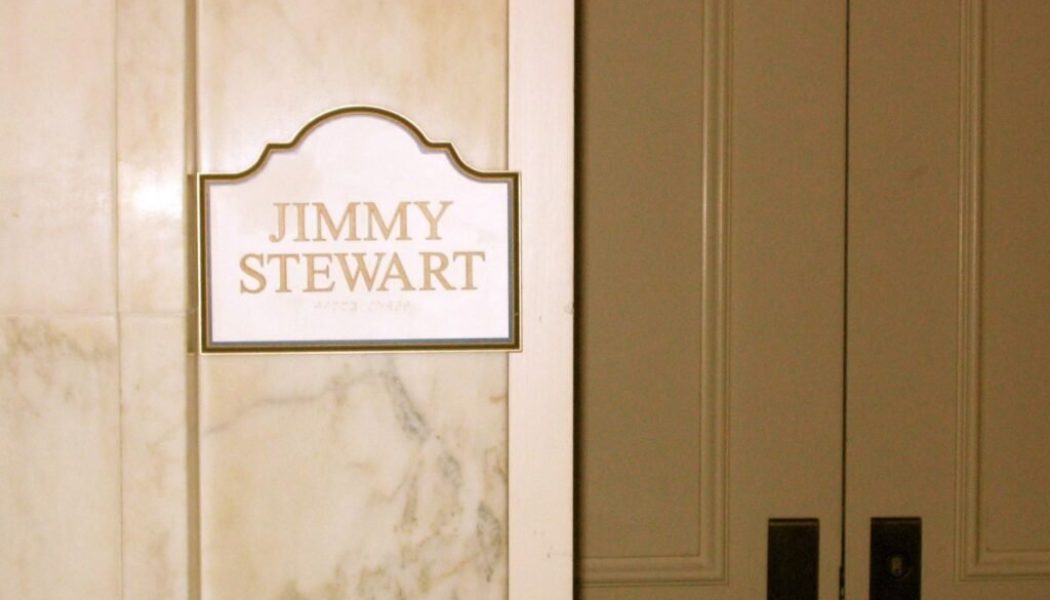

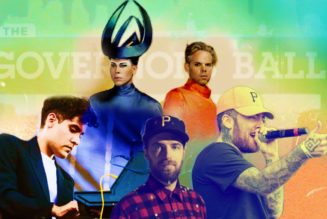
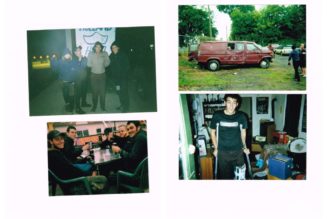
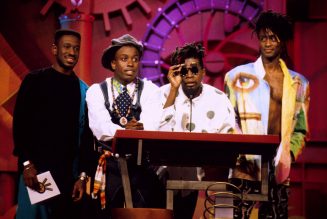
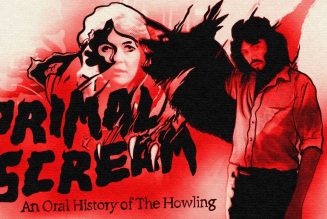
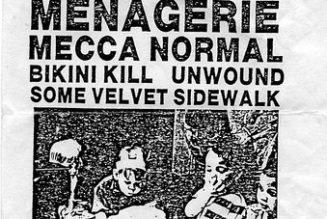

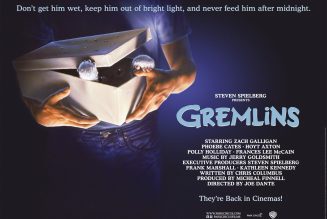
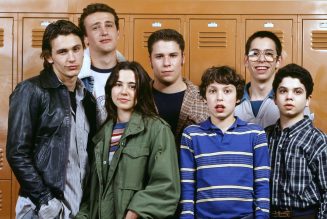

Tagged: Oral History, Umphrey's McGee